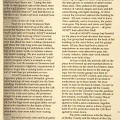[Headline] We came to Tennessee to Set Our People Free
Memphis in May is a city promotional gimic to draw tourists, but for the 500 ADAPT activists who gathered there the attraction was much bleaker. In the battle for MiCASA, the Medic-aid Community Attendant Services Act, one of the most common arguments against such a bill is that states should have control over what services they offer and how they are provided. "Every place is different" the argument goes, and "we know best how to take care of our own, in our own special circumstances." Well those of us in the disability community know the chilling implications of per of talk, but until a bright light is focused on the problem everyone can pretend it isn't there. Tennessee was given the dubious distinction of being the Number One Worst State, so May 9th through the 14th over 500 ADAPT activists from across the nation gathered on the banks of the mighty Mississippi River to show what happens when some states are left to their own devices.
After the workshops on Sunday morning, the public part of ADAPT gathering was kicked off with a rally in Court Square in downtown Memphis. The purpose: to announce the 10 Worst States for Community Based Attendant Services (see related article page 24), and announce ADAPT's purpose for ;.being in Memphis. Mother's Day was, appropriately, the backdrop of the event since more than any other group women are impacted by long term care policy.
The 10 Worst States (and five Dishonorable Mentions) were awarded in bed pans to representatives of each state who promised to deliver them to their Governors.
Representatives from various impacted groups in the Number One Worst State, the State of Tennessee, then spoke about various aspects of the issue. The President of People First of Tennessee, the group which success-fully sued to close down some of the worst state developmental disability institutions in the nation spoke about the importance of self determination. An institution escapee also of People First, spoke about civil rights for all. LaTonya Reeves, who used to live in a Memphis nursing home, spoke about how she had to move to Colorado to get the attendant services she needs to live in her own home. An ex-college professor who is currently warehoused in a Memphis nursing home, spoke of the long wasted days he now spends wishing he was elsewhere. An AARP Representative spoke of local legislative efforts and the need for more advocacy.
From the rally, a fleet of vans then loaded up and carried about 100 protesters to a local nursing home, Kings Daughters and Sons, KIDS, which "specializes" in younger folks with disabilities and which has court orders to keep the Memphis Center for Independent Living and ADAPT members away from those who want to get out. "We wanted to show support and solidarity for those inside and for them to know the protests this week arc - in part - for them" Memphis ADAPTer Dawn Russell explained. MCII members reported calls from KDS inmates who said in whispered tones "when you come here just pass me in the hall and pre-tend you don't know me." Lining the side-walk on the opposite side of the street, those at the vigil chanted "can you hear us, on the inside, can you hear us?" and laid flowers in the driveway Shadowed faces watched from the windows.
[Subheading] THE STATE OF THE STAFF
Since no one from Tennessee State Government had showed up at the rally to accept the Number One Worst State award, bright and early on Monday ADAPT marched over to the State building where Governor Sundquist has an office. We wanted to talk with him about his state's dubious distinction and about the state long term care funding (which is increasing for institutions while the rest of the nation works to increase community based funding). We also wanted to talk about his fixing the lousy 12 year old "pilot" waiver program which is available in only four of the over 90 counties in Tennessee and has such restrictive eligibility requirements it is easier to get into a nursing home or move out of state than get attendant services.
ADAPT marched across the huge expansive plaza on which Memphis' government buildings sit and straight into the State building. Hundreds of activists passed the .Security and took the elevators up to the 12th floor Governor's office. Packing themselves into every nook and cranny, the protesters sought to make room for as many others as possible. The elevators were finally turned off, but the huge stone and glass lobby served as an echo chamber for the chants of those below, so that even 12 floors above it was abundantly clear more folks were waiting below.
For several hours state and local police tried various shows of force to try and intimidate ADAPT into leaving. They marched around in uniforms in formation. They made announcements over loudspeakers about impending arrests. They carried giant bolt cutters up 12 flights of stairs. They pulled on the latex gloves so common at arrest scenes these days. They pulled in lift equipped vehicles of various shapes and sizes and left sirens blaring and lights flashing. At three o'clock the Governor ordered the building be closed. All state workers were told to leave. Then suddenly, and in formation, the police were gone. The trucks and sirens and lights and bolt cutters and latex gloves -- all gone. ADAPT had called their bluff.
Not all of ADAPT's troops had headed for the plaza level and elevators that morning. One group had headed for the back of the building on the street below, and the garage doors. All day there had been a dance of negotiations as non-state vehicles on non-state business were allowed to pass, like County vehicles, while state work related vehicles were held at bay.
At four o'clock, the activists still on the plaza level formed up and marched down to join with those on the street level below. State police forced shut the doors to the state garage, but the county garage next door remained under ADAPT control, and when we learned the Governor would let no food or medications up to those inside. We were ready to turn on the heat in return. No cars in or out of the county garage till the County put in a call to the Governor was the position of the day leaders. Though County officials at first refused, eventually the County Mayor agreed to try, but had no success. So we agreed to hold a press conference, together with the City Mayor, and in a show of good faith 50 of the protesters from the 12th floor agreed to come down.
The press conference with the Mayor of Shelby County and the Mayor of the City of Memphis went like a charm. Both Mayors, though not supporting ADAPT's tactics, standing behind ADAPT as they spoke to a bank of reporters, said the issue was a critical one that the Governor should address, and that they were trying to get the Governor to allow food and medications upstairs. The Governor was lone man out.
We marched back up to the plaza level and as the moon rose we divided up into shifts to maintain our vigil of support for those 103 still inside.
In the morning we reconvened in front of the state building for our meeting and found the Governor had declared the build-ing closed for another day. Sundquist was obviously willing to let people with disabilities hang. By maintaining the funding bias toward institutions and slashing any new funds for community based services in the last state legislature, he was in effect sentencing them to nursing homes without choice, without hope. Meanwhile he had collected contributions from this industry during his last election campaign. Some people sell their souls for power, Sundquist sold other people's liberty. But his actions toward ADAPT and on this issue had exposed attitude toward people with disabilities, young and old. His policy of "let them rot." was more public than ever before.
On talk radio shows people in nursing homes were calling in asking how they could get out, how they could join us. Folks had stopped by the vigil and our hotels to tell us of their support. Local advocacy groups were calling the Governor's office, calling other local elected officials to support us, dropping off water, and stopping by to show their support.
We had more work to do though, and another important message to send. At noon, roughly 24 hours after the visit had begun, the 103 came down fir a press conference.
Day three started much as the others with a march up to the Government Plaza. The State building was now surrounded by State troopers and they didn't look friendly.
But no problem. We were not headed that day. We were targeting the other culprit in the "states' rights" fiasco of a policy on long term care: the feds. The Clinton Administration's tepid - at best support community based services has long been a• point of frustration for ADAPT and others who have even the faintest belief in "liber and justice for all." At the MiCASA hearth the representatives from FICFA and Health and Human Services were probably the weakest link, even our opponents were a bigger help to the cause than these it just so happens that the Administrator, HCFA Nancy Ann Min DeParle, came to job direct from directing Health and Hum jet Services, in guess which state... And the second in command in the Clinton Administration, and hoping to be his heir apparent was Tennessee Native Son Al Gore. So not only was Tennessee taking gross advantage of federal policies to exploit her citizens who need support services, the state was serving up its leadership to direct national poll well.
ADAPT's plan was simple but effective. Encircle the building and make it a nursing home for a day. May in Memphis is not a cool time, especially hours in the hot sun. But tired as ADAPT's activists were they held firm. Tussles at doors with saw horse barricades, only furthered the proof ADA was there to stay. Our demands were faxed, to the Vice President, along with the message, that if we did not get some kind of response by three we would have to escalate.
What we had in mind was blocking street level entrances, but at 2:45 ADAV history was made when an abandoned ammo box was found in the bushes by the federal building. A bomb scare. Skeptical at first, leadership was shown the box, and soon learned that two of our members had been approached by someone who told them there
was a bomb in the area.
- Created on
- Thursday 18 July 2013
- Posted on
- Wednesday 27 November 2019
- Albums
- Visits
- 209
- Rating score
- no rate
- Rate this photo


0 comments